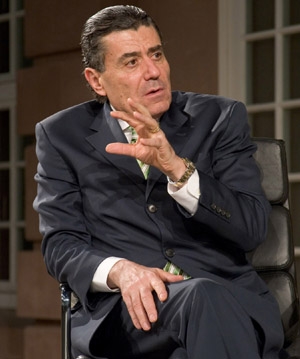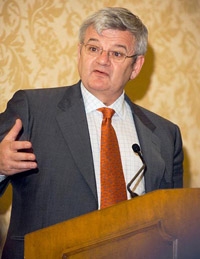The Burns social season has been in full swing with the annual awards dinner in Berlin on May 5 and the alumni dinner in New York on June 13. With impressive speakers and strong alumni attendance, both events were a great success.

Haim Saban discusses the differences in German and U.S. media companies.
On May 5, alumni and trustees gathered in the Deutsche Bank Atrium to hear Haim Saban, a global media mogul, discuss the differences in running a media company in Germany and the United States. The lively discussion also touched on politics and German foreign policy, among other issues. Saban’s entertainment company is best known for creating the “Mighty Morphin Power Rangers,” among many other children’s programs. He was half-owner of Fox Family Worldwide and is chairman of the supervisory board of Sat.1 Media. The 2005 Arthur F. Burns and George F. Kennan awards were also presented that evening. After the official dinner ended, nearly a hundred alumni continued to talk and exchange memories at the Regent bar until the early hours of the morning.

Haim Saban discusses the differences in German and U.S. media companies.
On June 13, approximately 100 alumni, trustees and other guests gathered at the Ritz-Carlton Battery Park in New York City to hear former German Foreign Minister Joschka Fischer discuss international relations. Fischer’s speech covered a range of policy issues, from U.S. world leadership, to rising energy consumption in China and India, to the distribution of wealth in the world. He highlighted both the challenges and the success of the European Union, stating that “the E.U. is one of those rare win-win situations…We created democracy, stability and a modern society in Europe.” But he felt there must be an “ongoing process of enlargement,” specifically including Turkey. Fischer also emphasized the need for a “stronger U.N. and stronger alliances,” as well as continuing leadership from the United States.
The Burns Fellowship program is grateful to Goldman, Sachs & Co. and Deutsche Bank for sponsoring these annual alumni events.



